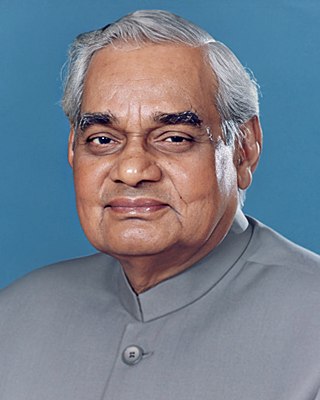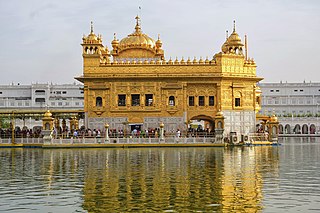Related Research Articles

The prime minister of India is the head of government of the Republic of India. Executive authority is vested in the prime minister and his chosen Council of Ministers, despite the president of India being the nominal head of the executive. The prime minister is often the leader of the party or the coalition with a majority in the lower house of the Parliament of India, the Lok Sabha, which is the main legislative body in the Republic of India. The prime minister and their cabinet are at all times responsible to the Lok Sabha.

Atal Bihari Vajpayee was an Indian politician who served three terms as the 10th Prime Minister of India, first for a term of 13 days in 1996, then for a period of 13 months from 1998 to 1999, followed by a full term from 1999 to 2004. Vajpayee was one of the co-founders and a senior leader of the BJP. He was a member of the RSS, a Hindu nationalist volunteer organisation. He was the first Indian prime minister not of the INC to serve a full term in office. He was also a renowned poet and a writer.

The Bharatiya Janata Party is a political party in India, and one of the two major Indian political parties alongside the Indian National Congress. Since 2014, it has been the ruling political party in India under Narendra Modi, the incumbent Indian prime minister. The BJP is aligned with right-wing politics, and its policies adhere to Hindutva, a Hindu nationalist ideology. It has close ideological and organisational links to the Rashtriya Swayamsevak Sangh (RSS). As of March 2023, it is the country's biggest political party in terms of representation in the Parliament of India as well as state legislatures.

The Indian National Congress (INC), colloquially the Congress Party or simply the Congress, is an Indian political party. Founded in 1885, it was the first modern nationalist movement to emerge in the British Empire in Asia and Africa. From the late 19th century, and especially after 1920, under the leadership of Mahatma Gandhi, the Congress became the principal leader of the Indian independence movement. The Congress led India to independence from the United Kingdom, and significantly influenced other anti-colonial nationalist movements in the British Empire.

Anna University is a public state university located in Tamil Nadu, India. The main campus is in Chennai. It was originally established on 4 September 1978 and is named after C. N. Annadurai, the former Chief Minister of Tamil Nadu.

The Bahujan Samaj Party (BSP) is a national level political party in India that was formed to represent Bahujans, referring to Scheduled Castes, Scheduled Tribes, and Other Backward Classes (OBC), along with religious minorities. According to Kanshi Ram, when he founded the party in 1984, the Bahujans comprised 85 percent of India's population, but were divided into 6,000 different castes. The party claims to be inspired by the philosophy of Gautama Buddha, B. R. Ambedkar, Mahatma Jyotiba Phule, Narayana Guru, and Chhatrapati Shahuji Maharaj.

Rajendra Prasad was an Indian politician, lawyer, Indian independence activist, journalist and scholar who served as the 1st President of India from 1950 to 1962. He joined the Indian National Congress during the Indian Independence Movement and became a major leader from the region of Bihar and Maharashtra. A supporter of Mahatma Gandhi, Prasad was imprisoned by British authorities during the Salt Satyagraha of 1930 and the Quit India movement of 1942. After the constituent assembly 1946 elections, Prasad served as 1st Minister of Food and Agriculture in the central government from 1947 to 1948. Upon independence in 1947, Prasad was elected as President of the Constituent Assembly of India, which prepared the Constitution of India and served as its provisional Parliament.

Joint Entrance Examination – Advanced (JEE-Advanced), is an academic examination held annually in India. It is organised by one of the seven zonal IITs under the guidance of the Joint Admission Board (JAB) on a round-robin rotation pattern for the qualifying candidates of the JEE-Main. It used to be the sole prerequisite for admission to the Indian Institutes of Technology bachelor's programs before the introduction of UCEED, Online B.S. and Olympiad entries, but seats through these new mediums are very low or difficult to complete the course.

The Red Fort or Lal Qila is a historic fort in the Old Delhi neighbourhood of Delhi, India, that historically served as the main residence of the Mughal emperors. Emperor Shah Jahan commissioned construction of the Red Fort on 12th May 1638, when he decided to shift his capital from Agra to Delhi. Originally red and white, its design is credited to architect Ustad Ahmad Lahori, who also constructed the Taj Mahal. The fort represents the peak in Mughal architecture under Shah Jahan and combines Persianate palace architecture with Indian traditions.

Pawan Kalyan is an Indian actor, politician, filmmaker, and philanthropist. He primarily works in Telugu cinema. He is the recipient of a Filmfare Award, a SIIMA Award, a CineMAA Award and a Santosham Film Award. He has featured in Forbes India's Celebrity 100 list in the years 2013, 2017, and 2018.
Joint Entrance Examination – Main (JEE-Main), formerly All India Engineering Entrance Examination (AIEEE), is an Indian standardised computer-based test for admission to various technical undergraduate programs in engineering, architecture, and planning across colleges in India. The exam is conducted by the National Testing Agency for admission to B.Tech, B.Arch, etc. programs in premier technical institutes such as the National Institutes of Technology (NIT) and Indian Institutes of Information Technology (IIIT), which are based on the rank secured in the JEE-Main. It is usually conducted twice every year. Since mid of 2019, the JEE has been conducted fully online as a computerised test.

The Republican Party of India is a political party in India. It had its roots in the Scheduled Castes Federation led by B. R. Ambedkar. The 'Training School for Entrance to Politics' was established by Ambedkar in 1956 which was to serve as an entry point to the Republican Party of India (RPI). The first batch of the school consisted of 15 students. Its first batch turned out to be last batch as the school was closed after Ambedkar's death in 1956.

The Common Law Admission Test (CLAT) is a centralized national-level entrance test for admissions to the 25 out of 26 National Law Universities (NLU) except NLU Delhi which takes admissions through All India Law Entrance Test (AILET). AILET is anticipated to be merged into CLAT in the coming years. A few private and self-financed law schools in India also use these scores for law admissions. Public sector undertakings in India like ONGC, Coal India, BHEL, Steel Authority of India, Oil India, Indian Army [For the recruitment of JAG officers] etc use CLAT Post Graduation scores . CLAT is considered & ranked one among the Top 10 toughest exams in India.

The Golden Temple is a gurdwara located in the city of Amritsar, Punjab, India. It is the preeminent spiritual site of Sikhism. It is one of the holiest sites in Sikhism, alongside the Gurdwara Darbar Sahib Kartarpur in Kartarpur, and Gurdwara Janam Asthan in Nankana Sahib.
The National Eligibility cum Entrance Test (Undergraduate) or NEET (UG), formerly the All India Pre-Medical Test (AIPMT), is an all India pre-medical entrance test for students who wish to pursue undergraduate medical (MBBS), dental (BDS) and AYUSH (BAMS, BUMS, BHMS, etc.) courses in government and private institutions in India and also, for those intending to pursue primary medical qualification abroad.

Anna Nagar Tower Park, officially known as Dr Visvesvaraya Tower Park, is an urban park in the suburb of Anna Nagar, Chennai. It is the tallest park tower in Chennai. The tower is open for public access from March 21st 2023. The park is also open.

The Election Commission of India (ECI) is a constitutional body. It was established by the Constitution of India to conduct and regulate elections in the country. Article 324 of the Constitution provides that the power of superintendence, direction, and control of elections to parliament, state legislatures, the office of the president of India, and the office of vice-president of India shall be vested in the election commission. Thus, the Election Commission is an all-India body in the sense that it is common to both the Central government and the state governments.
National Testing Agency (NTA) is an Indian government agency that has been approved by the Union Council of Ministers and established in November 2017 to conduct entrance examinations for educational institutions. The government appointed Vineet Joshi as the first Director-General of the agency. NTA is responsible for Joint Entrance Examination – Main, National Eligibility cum Entrance Test-Undergraduate, National Eligibility Test (NET), Common Management Admission Test (CMAT), Graduate Pharmacy Aptitude Test (GPAT), Common University Entrance Test (CUET) and All India Ayush Post Graduate Entrance Test (AIAPGET).
References
- ↑ "EntranceIndia". EntranceIndia. 30 March 2018. Retrieved 27 August 2018.